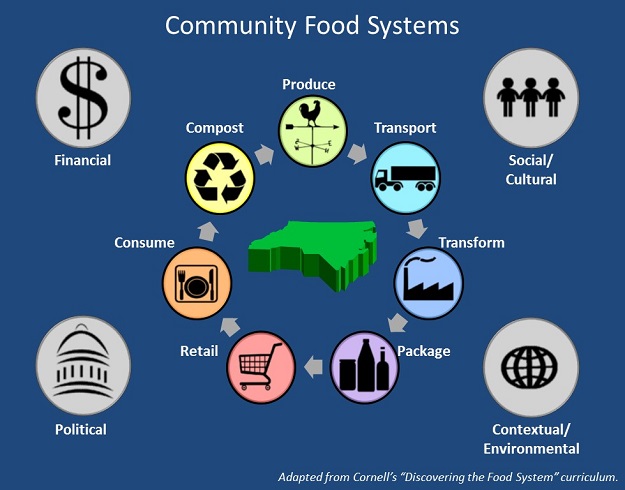DURHAM CONSIDERS A FOOD POLICY COUNCIL TO UNITE STAKEHOLDERS

Credit: Community Food Strategies
One hundred Durham community members gathered last week to learn about food policy council efforts across the state and to consider development of a council locally.
Hosted by the Durham Farm and Food Network, the meeting brought together a broad coalition of stakeholders—consumers, small businesses, producers, community organizations, government, and local leaders—interested in strengthening food policy, health, access and commerce in Durham.
“We want to create an open tent that includes all folks that are a part of this system,” explained Durham NAACP’s Roland Staton, in the meeting’s opening remarks.
Food policy councils are emerging across the state as an effective strategy for encouraging collaboration, dialogue, and action among disparate groups with common goals. At least 24 NC counties have councils, though active participation fluctuates, explains Jared Cates, Community Mobilizer for the Carolina Farm Stewardship Association and a team member of Community Food Strategies, a project of the Center for Environmental Farming Systems that offers resources and technical assistance to a network of developing food councils across North Carolina.
The Upper PeeDee Farm and Food Council, which represents the shared agricultural interests of three counties, demonstrates the collaborative potential of food policy councils. When the prevalence of solar farms in the region threatened to reduce agricultural land in production, the council worked with local government and Strata Solar on a mutually beneficial solution. Now sheep are permitted to graze on solar fields, affording farmers increased access to pasture while reducing mowing costs and the necessity of herbicides for the solar company.
“Another shining beacon of success is the Cabarrus Farm and Food Council,” says Cates. Founded as a sanctioned government board with county financial support, the group helped launch the Lomax Incubator Farm and convinced the county to join the NC 10% Campaign, pledging to commit ten percent of all food dollars to local suppliers. A shift in county leadership resulted in loss of funding, but the council remains active.
Community buy-in is an essential factor for the success of any food council, says Cates. He was encouraged by enthusiasm around the Durham event, which included broad representation from groups like the NAACP, the health department, local government, and community organizations in east Durham.
“Durham is poised to have a very successful council,” says Cates. “They’ll hit the ground running.”


